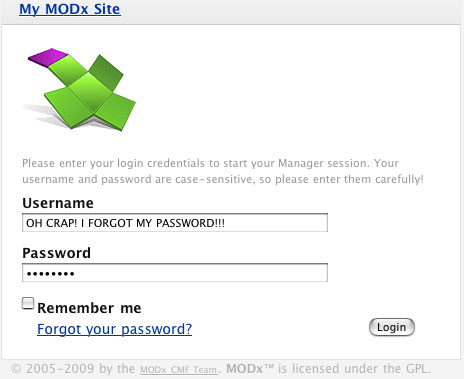MODx vs. WordPress (revisited)
September 25, 2011 Reading time: 6 minutes
The last article I wrote about this topic was criticized as being heavy-handed in my complaints about WordPress, so in this article, I am revisiting the topic from the other side of the fence. There are things about WordPress that are great, and there can many good reasons why you’d choose it as your Content Management System.
Ease of Updating
WordPress has done a fantastic job of making its product easy to use: each time there is a new version of WordPress, it takes only the click of a button to update your site. MODx still requires an FTP connection and an FTP client that can merge directories, otherwise, the upgrade can be hairy indeed. Unless you’ve got a really nice FTP client like Coda or you’ve got SSH access and you’re comfortable using cp -fr, then MODx can’t compete… MODx-ers will have to wait until version 2.2 or 2.3 when MODx will offer seamless upgrades.
WordPress also lets you easily upgrade all your plugins with a single click. MODx Revolution introduced package management, so you can see which plugins need updating, but it’s still not as streamlined as what WordPress offers. Read more
WordPress vs. MODx
April 19, 2011 Reading time: 29 minutes
There are a lot of Content Management Systems (CMS’s) out there, so I wanted to give a blow-by-blow analysis comparing two of them: MODx and WordPress. I feel oddly qualified to do so: Brian and I just authored a book on WordPress plugin plugin development (WordPress 3 Plugin Development), and I am a MODx Solution Partner who was invited to speak at the MODxpo conference in Dallas last year. I’ve used both flavors of MODx (Evolution and Revolution) and WordPress while building somewhere around 50 web sites over the past couple years, and I like both systems. I have even contributed a couple plugins for both systems (e.g. Custom Content Type Manager for WordPress). So after the urging of some friends and colleagues (like Kris), I’m organizing my techno-ramblings into a coherent article. Read more
Writing Custom PHP Snippets for MODx (part VII)
November 2, 2009 Reading time: 7 minutes
This article and tutorial video takes on how to add custom PHP scripts (known as Snippets) to the MODx content management system. This covers MODx Evolution (version 1.0 and before), but many of these methods and principles are applicable to MODx Revolution (version 2.0) and PHP coding in general.
Adding a Snippet
MODx newcomers are sometimes confused as to where to upload the PHP files… YOU DON’T UPLOAD IT. You paste it into a database record. You can reference files on the file system, but you don’t have to.
1. To add a Snippet from the MODx (v1) manager go to Elements –> Manage Elements –> Snippets then paste in your PHP code.
2. Be sure to give it a unique name (I recommend avoiding spaces in the name)
3. Give it a category: this will make your Snippet easier to find in the manager.
Read more
Forgot your MODx Password? You can reset it…
October 25, 2009 Reading time: 10 minutes
I have *cough* never forgotten my password to anything because I followed Brian’s excellent advice about storing passwords, but just in case some of you have, I thought I’d help you out.

First off, if you are locked out of your MODx manager, you can use the standard link on the manager page to email you your password, but I’m outlining how to do this in the event that you either didn’t enter a valid email address or you aren’t receiving your emails somehow. There are two things I’m going to outline: Read more
Enabling SEO Friendly URLs in MODx (part VI in the series)
May 26, 2009 Reading time: 7 minutes

Many content management systems rely on URL parameters like ?page=3 to determine which page is displayed to the user. MODx (like many other CMS’s) can use Apache’s .htaccess file to rewrite URLs so they are easier to read, e.g. www.mydomain.com/modx/tutorial, and this usually results in higher SEO scores. This article and its video walk you through how to accomplish this for MODx running on an Apache web server. Windows servers have something similar, they just charge more for it (haha).
Here’s the video. I was going to re-do this in high-def, but this was one of those lightning-strike rants that I was on… I just know it wouldn’t be as good if I attempted to remake it. Read more
Creating Templates in MODx Part II (part V in the series)
May 1, 2009 Reading time: 5 minutes
Now that you are able to create basic MODx templates from watching the previous video, let's learn how to extend their functionality even further with the inclusion of reusable chunks of code and dynamic PHP snippets.
Vocabulary
You only have to learn a couple new terms to understand what MODx is talking about — it’s not a steep learning curve, so jump in!
- Chunk — any bit of reusable text (usually HTML). Text used in a site’s footer is commonly placed into a chunk. MODx references chunks using double curly-braces: {{name_of_your_chunk}}, and they can be used almost anywhere, including page content and templates. Chunks can also contain Snippets!
- Snippet— this is a bit of PHP code (I remember Snippet by its double-P’s: sni-PhP-et). You can literally cut and paste almost any working PHP script into a MODx Snippet; once it has been created, you reference it using either double-square brackets or with a bracket and an exclamation point: [[Like_this]] or [!Like_this!], depending on whether you want it to always execute, or whether its output can be cached. See the MODx Wiki for more information. Read more